MBA402: Crafting a Code of Conduct for CBA: Ethics and Sustainability
VerifiedAdded on 2023/06/08
|13
|2597
|217
Case Study
AI Summary
This document presents a student-drafted Code of Conduct for the Commonwealth Bank of Australia (CBA), developed in response to identified governance and ethical issues. The code addresses critical areas including discrimination, exploitation, corruption, dishonest and fraudulent behavior, whistleblower protections, and enforcement mechanisms. It references Australian legislation and regulatory guidelines, aiming to foster a sustainable and transparent business environment. The document emphasizes the importance of adhering to both the letter and spirit of the code, with a focus on promoting workplace health and safety, preventing illegal activities like fraud and bribery, and ensuring fair and transparent operations. The code aims to guide board members and employees in upholding ethical standards and regulatory compliance within the Australian market.
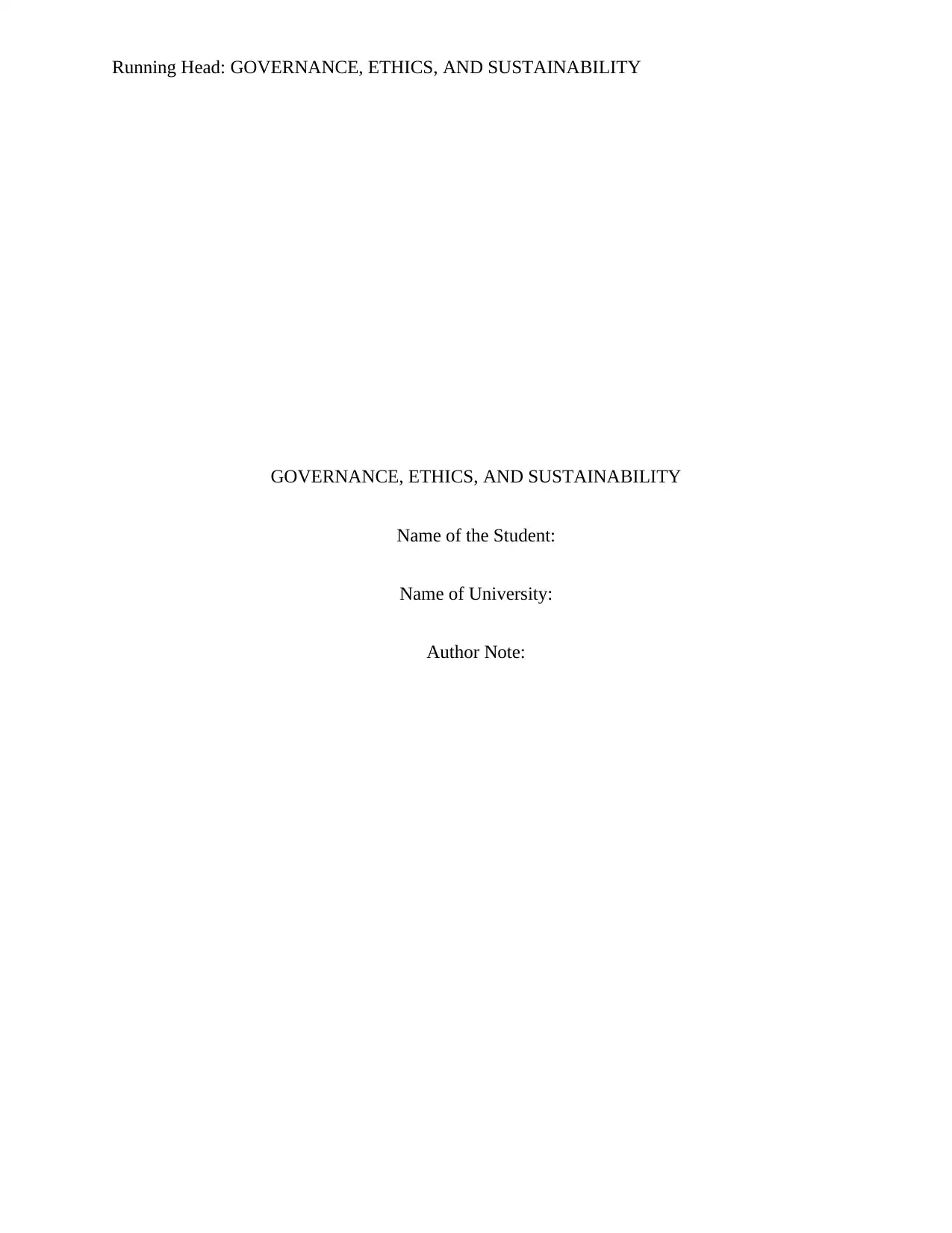
Running Head: GOVERNANCE, ETHICS, AND SUSTAINABILITY
GOVERNANCE, ETHICS, AND SUSTAINABILITY
Name of the Student:
Name of University:
Author Note:
GOVERNANCE, ETHICS, AND SUSTAINABILITY
Name of the Student:
Name of University:
Author Note:
Paraphrase This Document
Need a fresh take? Get an instant paraphrase of this document with our AI Paraphraser
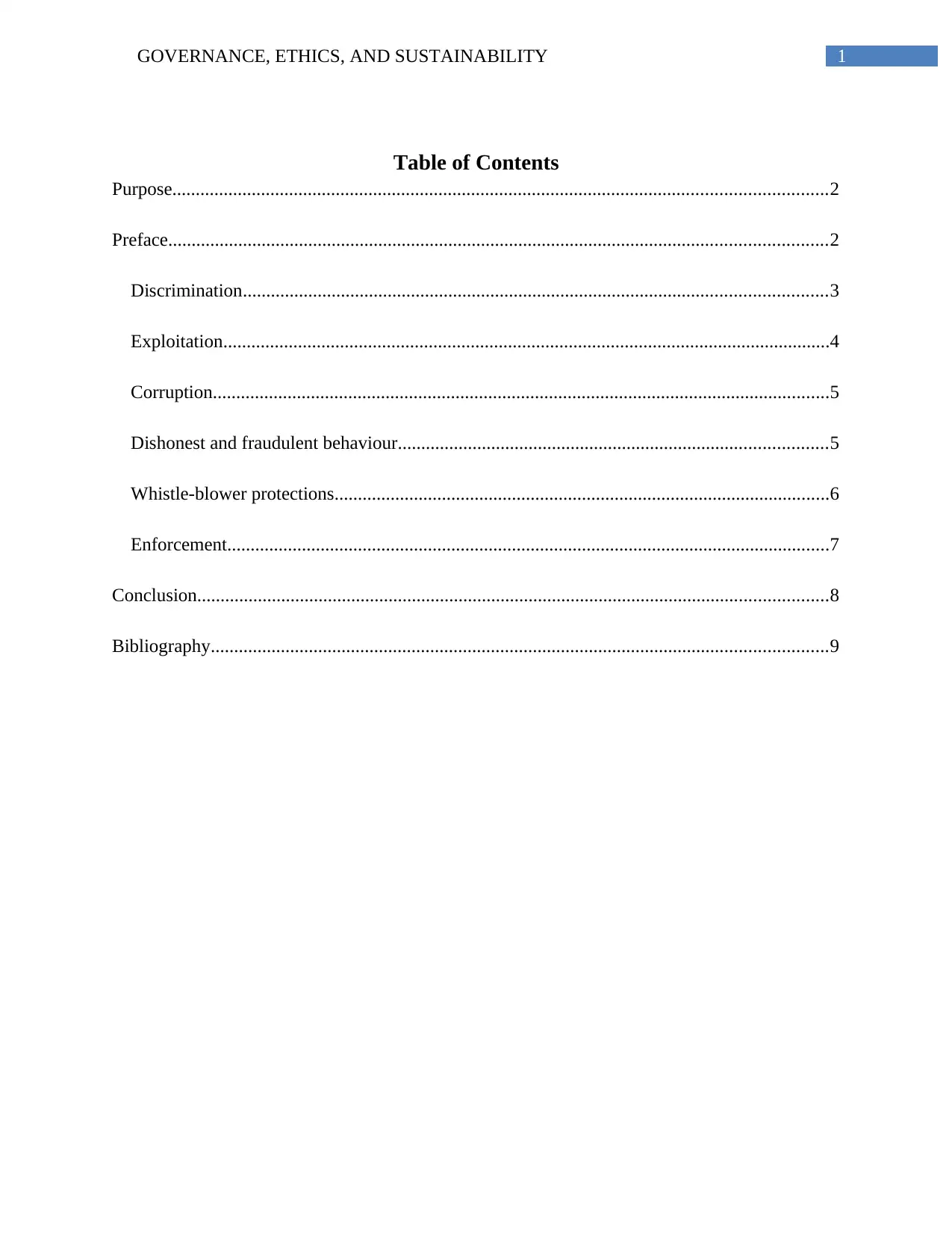
1GOVERNANCE, ETHICS, AND SUSTAINABILITY
Table of Contents
Purpose............................................................................................................................................2
Preface.............................................................................................................................................2
Discrimination.............................................................................................................................3
Exploitation..................................................................................................................................4
Corruption....................................................................................................................................5
Dishonest and fraudulent behaviour............................................................................................5
Whistle-blower protections..........................................................................................................6
Enforcement.................................................................................................................................7
Conclusion.......................................................................................................................................8
Bibliography....................................................................................................................................9
Table of Contents
Purpose............................................................................................................................................2
Preface.............................................................................................................................................2
Discrimination.............................................................................................................................3
Exploitation..................................................................................................................................4
Corruption....................................................................................................................................5
Dishonest and fraudulent behaviour............................................................................................5
Whistle-blower protections..........................................................................................................6
Enforcement.................................................................................................................................7
Conclusion.......................................................................................................................................8
Bibliography....................................................................................................................................9
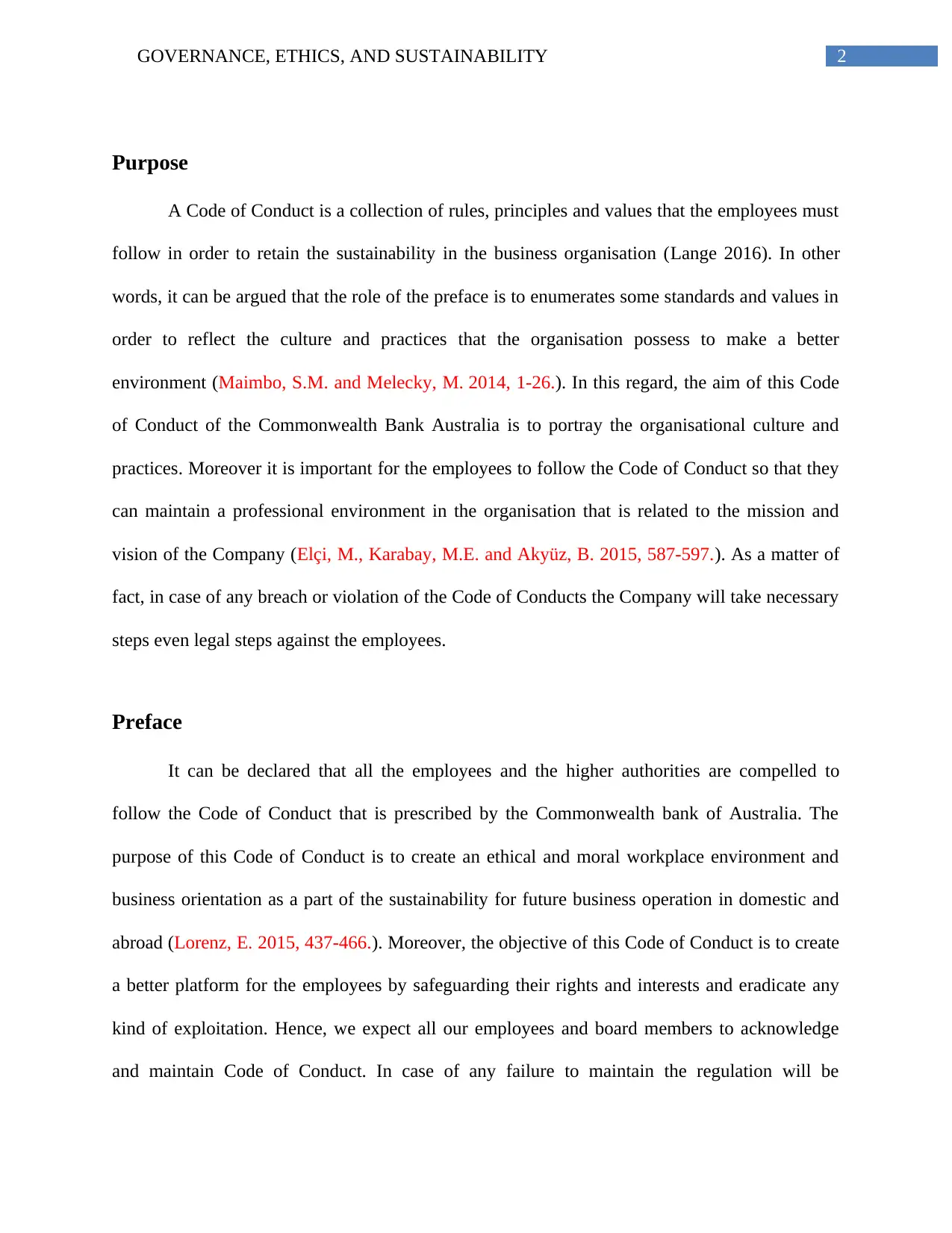
2GOVERNANCE, ETHICS, AND SUSTAINABILITY
Purpose
A Code of Conduct is a collection of rules, principles and values that the employees must
follow in order to retain the sustainability in the business organisation (Lange 2016). In other
words, it can be argued that the role of the preface is to enumerates some standards and values in
order to reflect the culture and practices that the organisation possess to make a better
environment (Maimbo, S.M. and Melecky, M. 2014, 1-26.). In this regard, the aim of this Code
of Conduct of the Commonwealth Bank Australia is to portray the organisational culture and
practices. Moreover it is important for the employees to follow the Code of Conduct so that they
can maintain a professional environment in the organisation that is related to the mission and
vision of the Company (Elçi, M., Karabay, M.E. and Akyüz, B. 2015, 587-597.). As a matter of
fact, in case of any breach or violation of the Code of Conducts the Company will take necessary
steps even legal steps against the employees.
Preface
It can be declared that all the employees and the higher authorities are compelled to
follow the Code of Conduct that is prescribed by the Commonwealth bank of Australia. The
purpose of this Code of Conduct is to create an ethical and moral workplace environment and
business orientation as a part of the sustainability for future business operation in domestic and
abroad (Lorenz, E. 2015, 437-466.). Moreover, the objective of this Code of Conduct is to create
a better platform for the employees by safeguarding their rights and interests and eradicate any
kind of exploitation. Hence, we expect all our employees and board members to acknowledge
and maintain Code of Conduct. In case of any failure to maintain the regulation will be
Purpose
A Code of Conduct is a collection of rules, principles and values that the employees must
follow in order to retain the sustainability in the business organisation (Lange 2016). In other
words, it can be argued that the role of the preface is to enumerates some standards and values in
order to reflect the culture and practices that the organisation possess to make a better
environment (Maimbo, S.M. and Melecky, M. 2014, 1-26.). In this regard, the aim of this Code
of Conduct of the Commonwealth Bank Australia is to portray the organisational culture and
practices. Moreover it is important for the employees to follow the Code of Conduct so that they
can maintain a professional environment in the organisation that is related to the mission and
vision of the Company (Elçi, M., Karabay, M.E. and Akyüz, B. 2015, 587-597.). As a matter of
fact, in case of any breach or violation of the Code of Conducts the Company will take necessary
steps even legal steps against the employees.
Preface
It can be declared that all the employees and the higher authorities are compelled to
follow the Code of Conduct that is prescribed by the Commonwealth bank of Australia. The
purpose of this Code of Conduct is to create an ethical and moral workplace environment and
business orientation as a part of the sustainability for future business operation in domestic and
abroad (Lorenz, E. 2015, 437-466.). Moreover, the objective of this Code of Conduct is to create
a better platform for the employees by safeguarding their rights and interests and eradicate any
kind of exploitation. Hence, we expect all our employees and board members to acknowledge
and maintain Code of Conduct. In case of any failure to maintain the regulation will be
⊘ This is a preview!⊘
Do you want full access?
Subscribe today to unlock all pages.

Trusted by 1+ million students worldwide
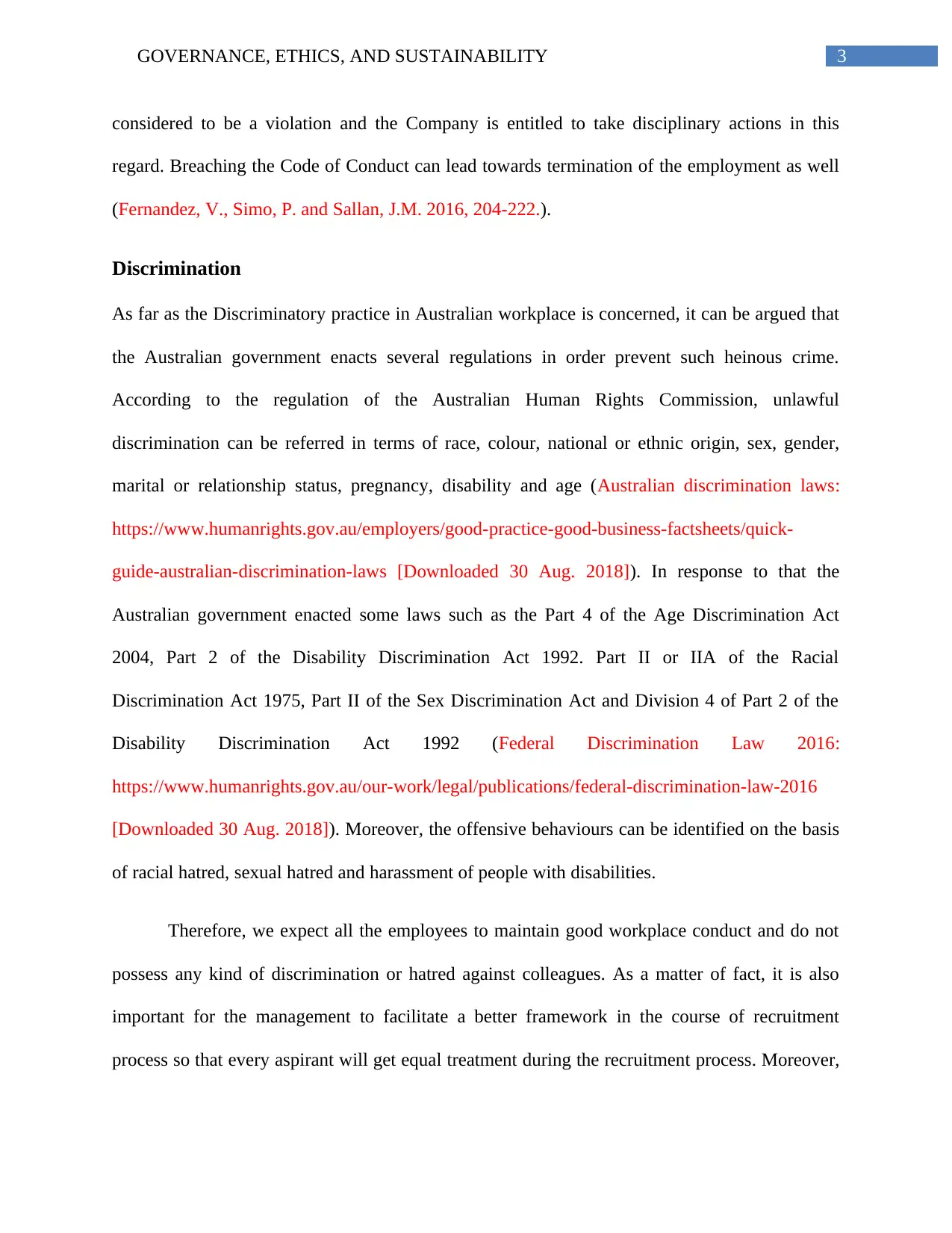
3GOVERNANCE, ETHICS, AND SUSTAINABILITY
considered to be a violation and the Company is entitled to take disciplinary actions in this
regard. Breaching the Code of Conduct can lead towards termination of the employment as well
(Fernandez, V., Simo, P. and Sallan, J.M. 2016, 204-222.).
Discrimination
As far as the Discriminatory practice in Australian workplace is concerned, it can be argued that
the Australian government enacts several regulations in order prevent such heinous crime.
According to the regulation of the Australian Human Rights Commission, unlawful
discrimination can be referred in terms of race, colour, national or ethnic origin, sex, gender,
marital or relationship status, pregnancy, disability and age (Australian discrimination laws:
https://www.humanrights.gov.au/employers/good-practice-good-business-factsheets/quick-
guide-australian-discrimination-laws [Downloaded 30 Aug. 2018]). In response to that the
Australian government enacted some laws such as the Part 4 of the Age Discrimination Act
2004, Part 2 of the Disability Discrimination Act 1992. Part II or IIA of the Racial
Discrimination Act 1975, Part II of the Sex Discrimination Act and Division 4 of Part 2 of the
Disability Discrimination Act 1992 (Federal Discrimination Law 2016:
https://www.humanrights.gov.au/our-work/legal/publications/federal-discrimination-law-2016
[Downloaded 30 Aug. 2018]). Moreover, the offensive behaviours can be identified on the basis
of racial hatred, sexual hatred and harassment of people with disabilities.
Therefore, we expect all the employees to maintain good workplace conduct and do not
possess any kind of discrimination or hatred against colleagues. As a matter of fact, it is also
important for the management to facilitate a better framework in the course of recruitment
process so that every aspirant will get equal treatment during the recruitment process. Moreover,
considered to be a violation and the Company is entitled to take disciplinary actions in this
regard. Breaching the Code of Conduct can lead towards termination of the employment as well
(Fernandez, V., Simo, P. and Sallan, J.M. 2016, 204-222.).
Discrimination
As far as the Discriminatory practice in Australian workplace is concerned, it can be argued that
the Australian government enacts several regulations in order prevent such heinous crime.
According to the regulation of the Australian Human Rights Commission, unlawful
discrimination can be referred in terms of race, colour, national or ethnic origin, sex, gender,
marital or relationship status, pregnancy, disability and age (Australian discrimination laws:
https://www.humanrights.gov.au/employers/good-practice-good-business-factsheets/quick-
guide-australian-discrimination-laws [Downloaded 30 Aug. 2018]). In response to that the
Australian government enacted some laws such as the Part 4 of the Age Discrimination Act
2004, Part 2 of the Disability Discrimination Act 1992. Part II or IIA of the Racial
Discrimination Act 1975, Part II of the Sex Discrimination Act and Division 4 of Part 2 of the
Disability Discrimination Act 1992 (Federal Discrimination Law 2016:
https://www.humanrights.gov.au/our-work/legal/publications/federal-discrimination-law-2016
[Downloaded 30 Aug. 2018]). Moreover, the offensive behaviours can be identified on the basis
of racial hatred, sexual hatred and harassment of people with disabilities.
Therefore, we expect all the employees to maintain good workplace conduct and do not
possess any kind of discrimination or hatred against colleagues. As a matter of fact, it is also
important for the management to facilitate a better framework in the course of recruitment
process so that every aspirant will get equal treatment during the recruitment process. Moreover,
Paraphrase This Document
Need a fresh take? Get an instant paraphrase of this document with our AI Paraphraser
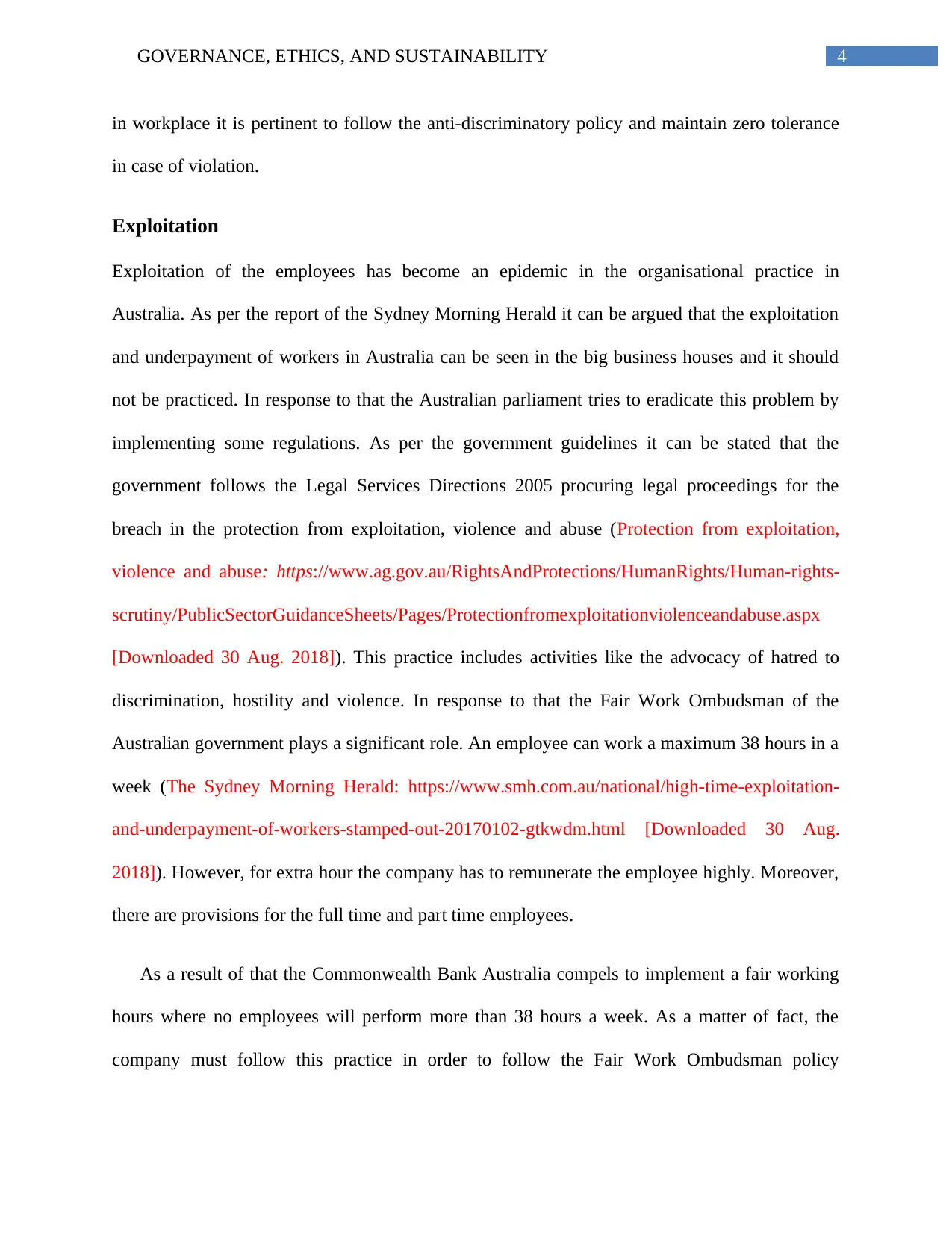
4GOVERNANCE, ETHICS, AND SUSTAINABILITY
in workplace it is pertinent to follow the anti-discriminatory policy and maintain zero tolerance
in case of violation.
Exploitation
Exploitation of the employees has become an epidemic in the organisational practice in
Australia. As per the report of the Sydney Morning Herald it can be argued that the exploitation
and underpayment of workers in Australia can be seen in the big business houses and it should
not be practiced. In response to that the Australian parliament tries to eradicate this problem by
implementing some regulations. As per the government guidelines it can be stated that the
government follows the Legal Services Directions 2005 procuring legal proceedings for the
breach in the protection from exploitation, violence and abuse (Protection from exploitation,
violence and abuse: https://www.ag.gov.au/RightsAndProtections/HumanRights/Human-rights-
scrutiny/PublicSectorGuidanceSheets/Pages/Protectionfromexploitationviolenceandabuse.aspx
[Downloaded 30 Aug. 2018]). This practice includes activities like the advocacy of hatred to
discrimination, hostility and violence. In response to that the Fair Work Ombudsman of the
Australian government plays a significant role. An employee can work a maximum 38 hours in a
week (The Sydney Morning Herald: https://www.smh.com.au/national/high-time-exploitation-
and-underpayment-of-workers-stamped-out-20170102-gtkwdm.html [Downloaded 30 Aug.
2018]). However, for extra hour the company has to remunerate the employee highly. Moreover,
there are provisions for the full time and part time employees.
As a result of that the Commonwealth Bank Australia compels to implement a fair working
hours where no employees will perform more than 38 hours a week. As a matter of fact, the
company must follow this practice in order to follow the Fair Work Ombudsman policy
in workplace it is pertinent to follow the anti-discriminatory policy and maintain zero tolerance
in case of violation.
Exploitation
Exploitation of the employees has become an epidemic in the organisational practice in
Australia. As per the report of the Sydney Morning Herald it can be argued that the exploitation
and underpayment of workers in Australia can be seen in the big business houses and it should
not be practiced. In response to that the Australian parliament tries to eradicate this problem by
implementing some regulations. As per the government guidelines it can be stated that the
government follows the Legal Services Directions 2005 procuring legal proceedings for the
breach in the protection from exploitation, violence and abuse (Protection from exploitation,
violence and abuse: https://www.ag.gov.au/RightsAndProtections/HumanRights/Human-rights-
scrutiny/PublicSectorGuidanceSheets/Pages/Protectionfromexploitationviolenceandabuse.aspx
[Downloaded 30 Aug. 2018]). This practice includes activities like the advocacy of hatred to
discrimination, hostility and violence. In response to that the Fair Work Ombudsman of the
Australian government plays a significant role. An employee can work a maximum 38 hours in a
week (The Sydney Morning Herald: https://www.smh.com.au/national/high-time-exploitation-
and-underpayment-of-workers-stamped-out-20170102-gtkwdm.html [Downloaded 30 Aug.
2018]). However, for extra hour the company has to remunerate the employee highly. Moreover,
there are provisions for the full time and part time employees.
As a result of that the Commonwealth Bank Australia compels to implement a fair working
hours where no employees will perform more than 38 hours a week. As a matter of fact, the
company must follow this practice in order to follow the Fair Work Ombudsman policy
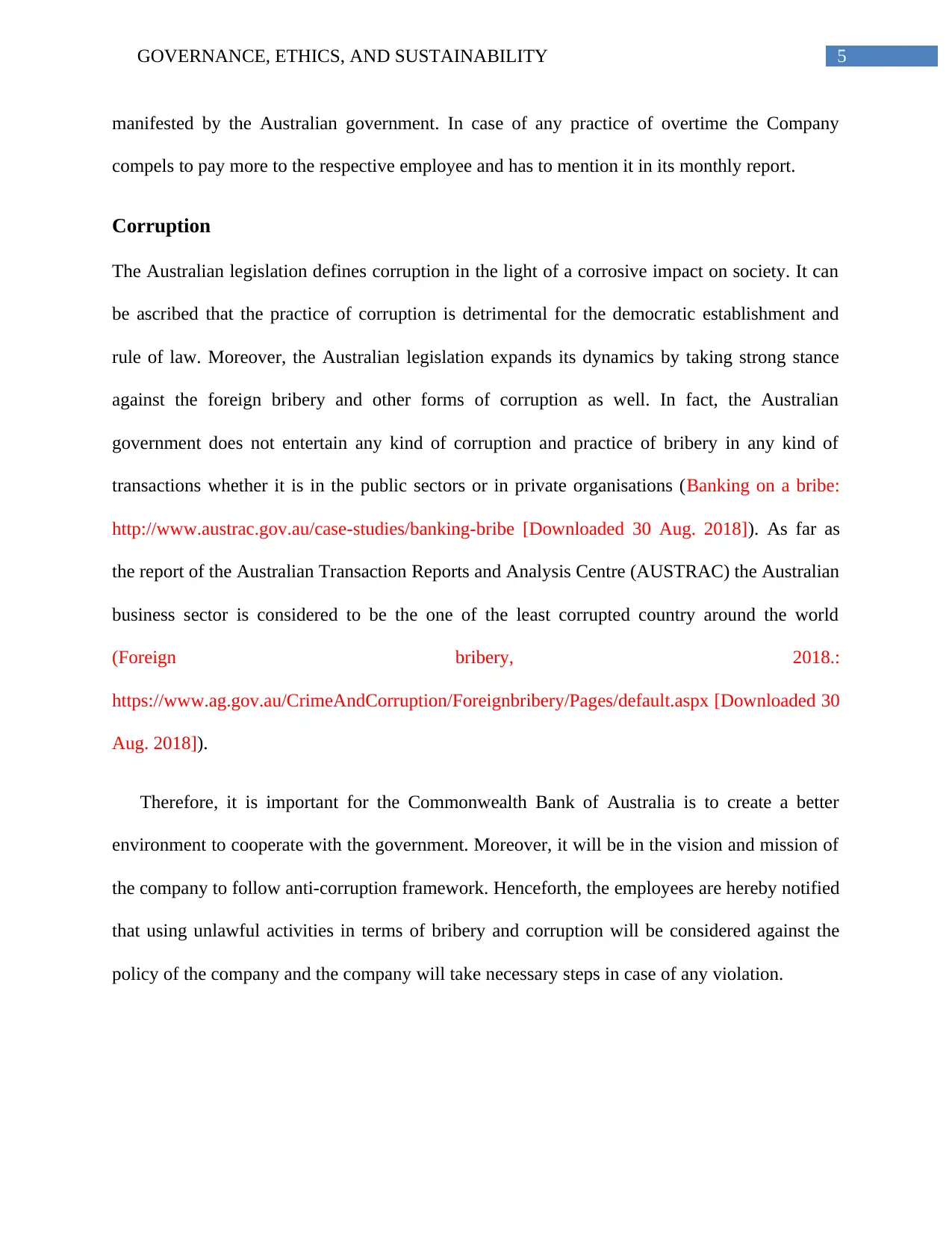
5GOVERNANCE, ETHICS, AND SUSTAINABILITY
manifested by the Australian government. In case of any practice of overtime the Company
compels to pay more to the respective employee and has to mention it in its monthly report.
Corruption
The Australian legislation defines corruption in the light of a corrosive impact on society. It can
be ascribed that the practice of corruption is detrimental for the democratic establishment and
rule of law. Moreover, the Australian legislation expands its dynamics by taking strong stance
against the foreign bribery and other forms of corruption as well. In fact, the Australian
government does not entertain any kind of corruption and practice of bribery in any kind of
transactions whether it is in the public sectors or in private organisations (Banking on a bribe:
http://www.austrac.gov.au/case-studies/banking-bribe [Downloaded 30 Aug. 2018]). As far as
the report of the Australian Transaction Reports and Analysis Centre (AUSTRAC) the Australian
business sector is considered to be the one of the least corrupted country around the world
(Foreign bribery, 2018.:
https://www.ag.gov.au/CrimeAndCorruption/Foreignbribery/Pages/default.aspx [Downloaded 30
Aug. 2018]).
Therefore, it is important for the Commonwealth Bank of Australia is to create a better
environment to cooperate with the government. Moreover, it will be in the vision and mission of
the company to follow anti-corruption framework. Henceforth, the employees are hereby notified
that using unlawful activities in terms of bribery and corruption will be considered against the
policy of the company and the company will take necessary steps in case of any violation.
manifested by the Australian government. In case of any practice of overtime the Company
compels to pay more to the respective employee and has to mention it in its monthly report.
Corruption
The Australian legislation defines corruption in the light of a corrosive impact on society. It can
be ascribed that the practice of corruption is detrimental for the democratic establishment and
rule of law. Moreover, the Australian legislation expands its dynamics by taking strong stance
against the foreign bribery and other forms of corruption as well. In fact, the Australian
government does not entertain any kind of corruption and practice of bribery in any kind of
transactions whether it is in the public sectors or in private organisations (Banking on a bribe:
http://www.austrac.gov.au/case-studies/banking-bribe [Downloaded 30 Aug. 2018]). As far as
the report of the Australian Transaction Reports and Analysis Centre (AUSTRAC) the Australian
business sector is considered to be the one of the least corrupted country around the world
(Foreign bribery, 2018.:
https://www.ag.gov.au/CrimeAndCorruption/Foreignbribery/Pages/default.aspx [Downloaded 30
Aug. 2018]).
Therefore, it is important for the Commonwealth Bank of Australia is to create a better
environment to cooperate with the government. Moreover, it will be in the vision and mission of
the company to follow anti-corruption framework. Henceforth, the employees are hereby notified
that using unlawful activities in terms of bribery and corruption will be considered against the
policy of the company and the company will take necessary steps in case of any violation.
⊘ This is a preview!⊘
Do you want full access?
Subscribe today to unlock all pages.

Trusted by 1+ million students worldwide
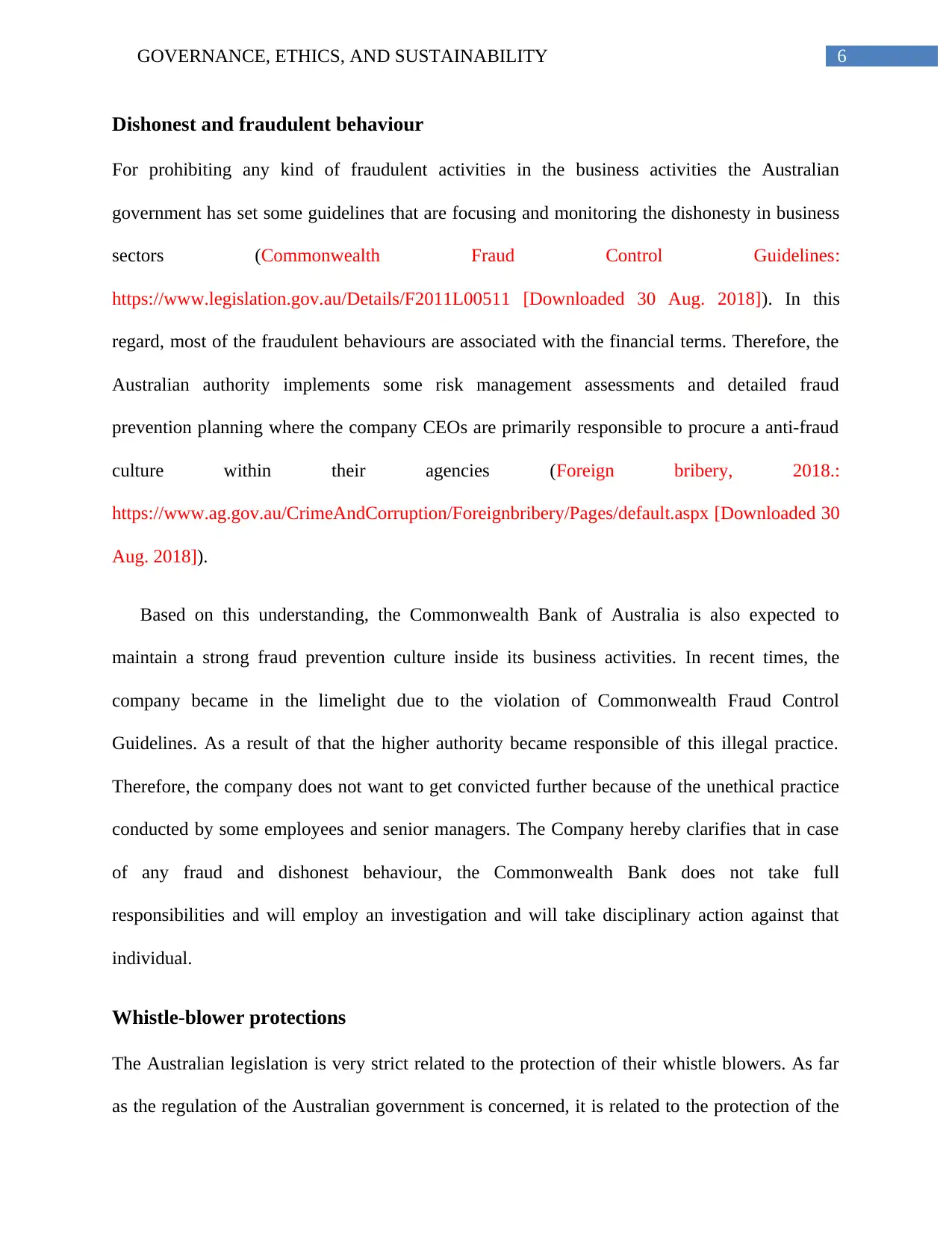
6GOVERNANCE, ETHICS, AND SUSTAINABILITY
Dishonest and fraudulent behaviour
For prohibiting any kind of fraudulent activities in the business activities the Australian
government has set some guidelines that are focusing and monitoring the dishonesty in business
sectors (Commonwealth Fraud Control Guidelines:
https://www.legislation.gov.au/Details/F2011L00511 [Downloaded 30 Aug. 2018]). In this
regard, most of the fraudulent behaviours are associated with the financial terms. Therefore, the
Australian authority implements some risk management assessments and detailed fraud
prevention planning where the company CEOs are primarily responsible to procure a anti-fraud
culture within their agencies (Foreign bribery, 2018.:
https://www.ag.gov.au/CrimeAndCorruption/Foreignbribery/Pages/default.aspx [Downloaded 30
Aug. 2018]).
Based on this understanding, the Commonwealth Bank of Australia is also expected to
maintain a strong fraud prevention culture inside its business activities. In recent times, the
company became in the limelight due to the violation of Commonwealth Fraud Control
Guidelines. As a result of that the higher authority became responsible of this illegal practice.
Therefore, the company does not want to get convicted further because of the unethical practice
conducted by some employees and senior managers. The Company hereby clarifies that in case
of any fraud and dishonest behaviour, the Commonwealth Bank does not take full
responsibilities and will employ an investigation and will take disciplinary action against that
individual.
Whistle-blower protections
The Australian legislation is very strict related to the protection of their whistle blowers. As far
as the regulation of the Australian government is concerned, it is related to the protection of the
Dishonest and fraudulent behaviour
For prohibiting any kind of fraudulent activities in the business activities the Australian
government has set some guidelines that are focusing and monitoring the dishonesty in business
sectors (Commonwealth Fraud Control Guidelines:
https://www.legislation.gov.au/Details/F2011L00511 [Downloaded 30 Aug. 2018]). In this
regard, most of the fraudulent behaviours are associated with the financial terms. Therefore, the
Australian authority implements some risk management assessments and detailed fraud
prevention planning where the company CEOs are primarily responsible to procure a anti-fraud
culture within their agencies (Foreign bribery, 2018.:
https://www.ag.gov.au/CrimeAndCorruption/Foreignbribery/Pages/default.aspx [Downloaded 30
Aug. 2018]).
Based on this understanding, the Commonwealth Bank of Australia is also expected to
maintain a strong fraud prevention culture inside its business activities. In recent times, the
company became in the limelight due to the violation of Commonwealth Fraud Control
Guidelines. As a result of that the higher authority became responsible of this illegal practice.
Therefore, the company does not want to get convicted further because of the unethical practice
conducted by some employees and senior managers. The Company hereby clarifies that in case
of any fraud and dishonest behaviour, the Commonwealth Bank does not take full
responsibilities and will employ an investigation and will take disciplinary action against that
individual.
Whistle-blower protections
The Australian legislation is very strict related to the protection of their whistle blowers. As far
as the regulation of the Australian government is concerned, it is related to the protection of the
Paraphrase This Document
Need a fresh take? Get an instant paraphrase of this document with our AI Paraphraser
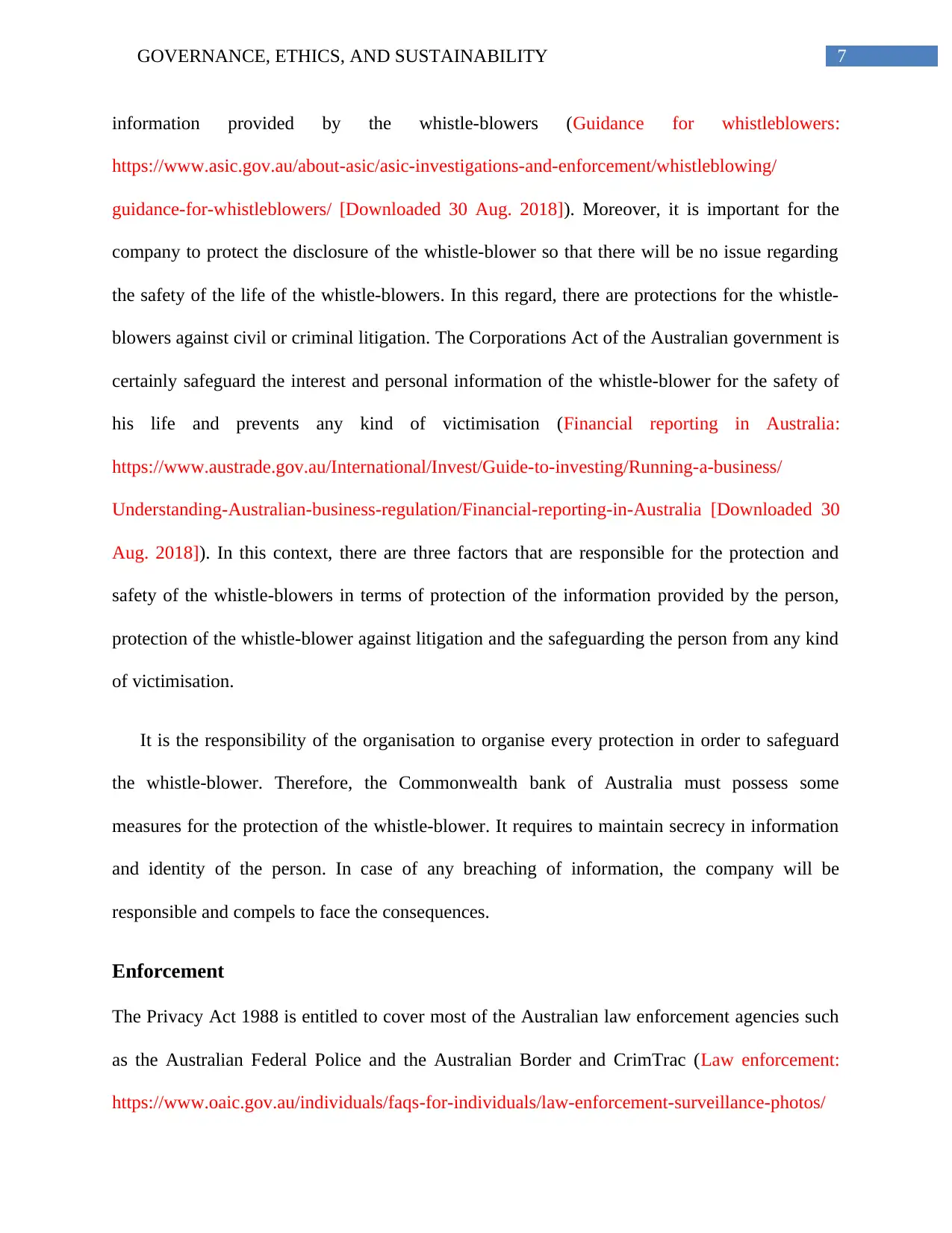
7GOVERNANCE, ETHICS, AND SUSTAINABILITY
information provided by the whistle-blowers (Guidance for whistleblowers:
https://www.asic.gov.au/about-asic/asic-investigations-and-enforcement/whistleblowing/
guidance-for-whistleblowers/ [Downloaded 30 Aug. 2018]). Moreover, it is important for the
company to protect the disclosure of the whistle-blower so that there will be no issue regarding
the safety of the life of the whistle-blowers. In this regard, there are protections for the whistle-
blowers against civil or criminal litigation. The Corporations Act of the Australian government is
certainly safeguard the interest and personal information of the whistle-blower for the safety of
his life and prevents any kind of victimisation (Financial reporting in Australia:
https://www.austrade.gov.au/International/Invest/Guide-to-investing/Running-a-business/
Understanding-Australian-business-regulation/Financial-reporting-in-Australia [Downloaded 30
Aug. 2018]). In this context, there are three factors that are responsible for the protection and
safety of the whistle-blowers in terms of protection of the information provided by the person,
protection of the whistle-blower against litigation and the safeguarding the person from any kind
of victimisation.
It is the responsibility of the organisation to organise every protection in order to safeguard
the whistle-blower. Therefore, the Commonwealth bank of Australia must possess some
measures for the protection of the whistle-blower. It requires to maintain secrecy in information
and identity of the person. In case of any breaching of information, the company will be
responsible and compels to face the consequences.
Enforcement
The Privacy Act 1988 is entitled to cover most of the Australian law enforcement agencies such
as the Australian Federal Police and the Australian Border and CrimTrac (Law enforcement:
https://www.oaic.gov.au/individuals/faqs-for-individuals/law-enforcement-surveillance-photos/
information provided by the whistle-blowers (Guidance for whistleblowers:
https://www.asic.gov.au/about-asic/asic-investigations-and-enforcement/whistleblowing/
guidance-for-whistleblowers/ [Downloaded 30 Aug. 2018]). Moreover, it is important for the
company to protect the disclosure of the whistle-blower so that there will be no issue regarding
the safety of the life of the whistle-blowers. In this regard, there are protections for the whistle-
blowers against civil or criminal litigation. The Corporations Act of the Australian government is
certainly safeguard the interest and personal information of the whistle-blower for the safety of
his life and prevents any kind of victimisation (Financial reporting in Australia:
https://www.austrade.gov.au/International/Invest/Guide-to-investing/Running-a-business/
Understanding-Australian-business-regulation/Financial-reporting-in-Australia [Downloaded 30
Aug. 2018]). In this context, there are three factors that are responsible for the protection and
safety of the whistle-blowers in terms of protection of the information provided by the person,
protection of the whistle-blower against litigation and the safeguarding the person from any kind
of victimisation.
It is the responsibility of the organisation to organise every protection in order to safeguard
the whistle-blower. Therefore, the Commonwealth bank of Australia must possess some
measures for the protection of the whistle-blower. It requires to maintain secrecy in information
and identity of the person. In case of any breaching of information, the company will be
responsible and compels to face the consequences.
Enforcement
The Privacy Act 1988 is entitled to cover most of the Australian law enforcement agencies such
as the Australian Federal Police and the Australian Border and CrimTrac (Law enforcement:
https://www.oaic.gov.au/individuals/faqs-for-individuals/law-enforcement-surveillance-photos/
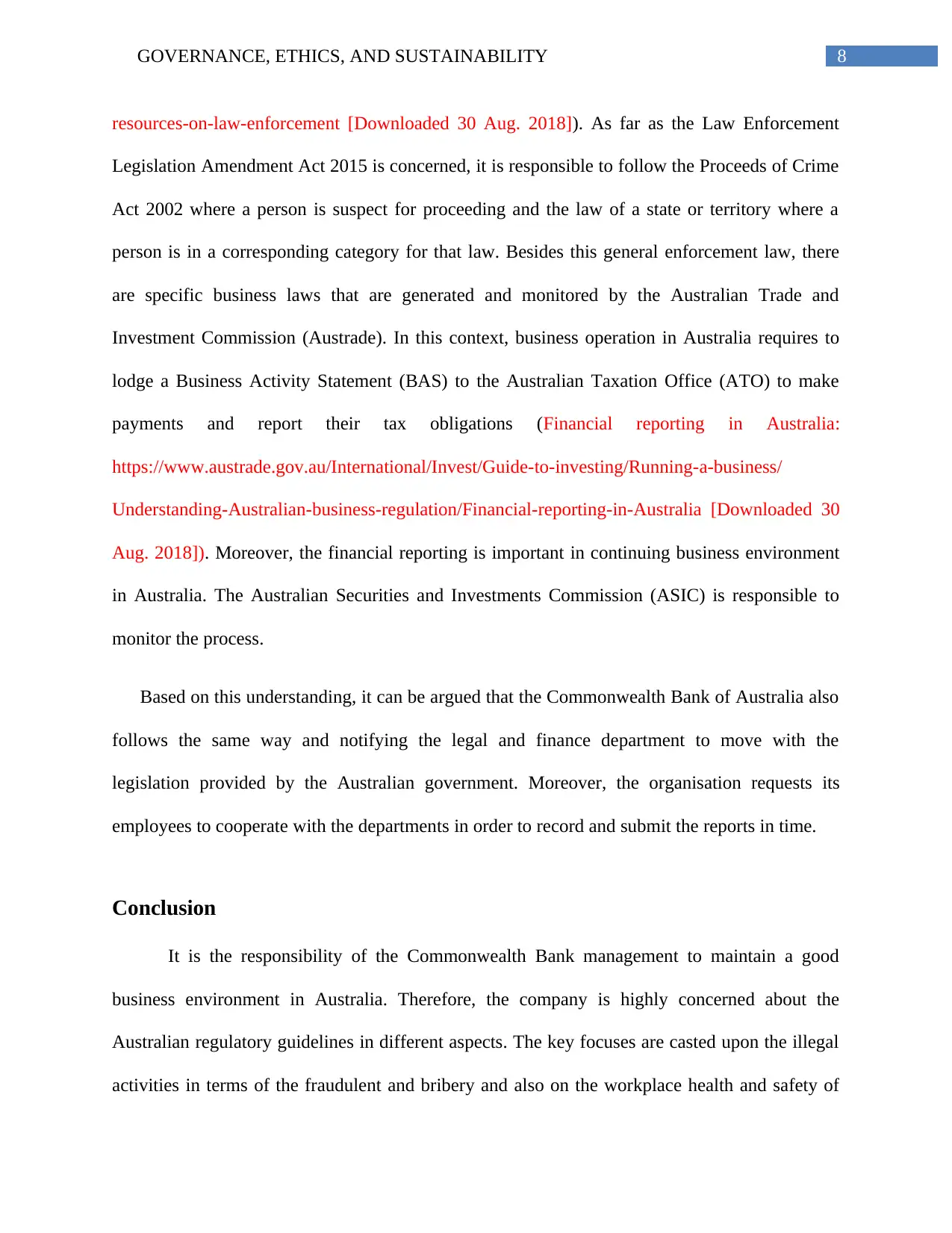
8GOVERNANCE, ETHICS, AND SUSTAINABILITY
resources-on-law-enforcement [Downloaded 30 Aug. 2018]). As far as the Law Enforcement
Legislation Amendment Act 2015 is concerned, it is responsible to follow the Proceeds of Crime
Act 2002 where a person is suspect for proceeding and the law of a state or territory where a
person is in a corresponding category for that law. Besides this general enforcement law, there
are specific business laws that are generated and monitored by the Australian Trade and
Investment Commission (Austrade). In this context, business operation in Australia requires to
lodge a Business Activity Statement (BAS) to the Australian Taxation Office (ATO) to make
payments and report their tax obligations (Financial reporting in Australia:
https://www.austrade.gov.au/International/Invest/Guide-to-investing/Running-a-business/
Understanding-Australian-business-regulation/Financial-reporting-in-Australia [Downloaded 30
Aug. 2018]). Moreover, the financial reporting is important in continuing business environment
in Australia. The Australian Securities and Investments Commission (ASIC) is responsible to
monitor the process.
Based on this understanding, it can be argued that the Commonwealth Bank of Australia also
follows the same way and notifying the legal and finance department to move with the
legislation provided by the Australian government. Moreover, the organisation requests its
employees to cooperate with the departments in order to record and submit the reports in time.
Conclusion
It is the responsibility of the Commonwealth Bank management to maintain a good
business environment in Australia. Therefore, the company is highly concerned about the
Australian regulatory guidelines in different aspects. The key focuses are casted upon the illegal
activities in terms of the fraudulent and bribery and also on the workplace health and safety of
resources-on-law-enforcement [Downloaded 30 Aug. 2018]). As far as the Law Enforcement
Legislation Amendment Act 2015 is concerned, it is responsible to follow the Proceeds of Crime
Act 2002 where a person is suspect for proceeding and the law of a state or territory where a
person is in a corresponding category for that law. Besides this general enforcement law, there
are specific business laws that are generated and monitored by the Australian Trade and
Investment Commission (Austrade). In this context, business operation in Australia requires to
lodge a Business Activity Statement (BAS) to the Australian Taxation Office (ATO) to make
payments and report their tax obligations (Financial reporting in Australia:
https://www.austrade.gov.au/International/Invest/Guide-to-investing/Running-a-business/
Understanding-Australian-business-regulation/Financial-reporting-in-Australia [Downloaded 30
Aug. 2018]). Moreover, the financial reporting is important in continuing business environment
in Australia. The Australian Securities and Investments Commission (ASIC) is responsible to
monitor the process.
Based on this understanding, it can be argued that the Commonwealth Bank of Australia also
follows the same way and notifying the legal and finance department to move with the
legislation provided by the Australian government. Moreover, the organisation requests its
employees to cooperate with the departments in order to record and submit the reports in time.
Conclusion
It is the responsibility of the Commonwealth Bank management to maintain a good
business environment in Australia. Therefore, the company is highly concerned about the
Australian regulatory guidelines in different aspects. The key focuses are casted upon the illegal
activities in terms of the fraudulent and bribery and also on the workplace health and safety of
⊘ This is a preview!⊘
Do you want full access?
Subscribe today to unlock all pages.

Trusted by 1+ million students worldwide
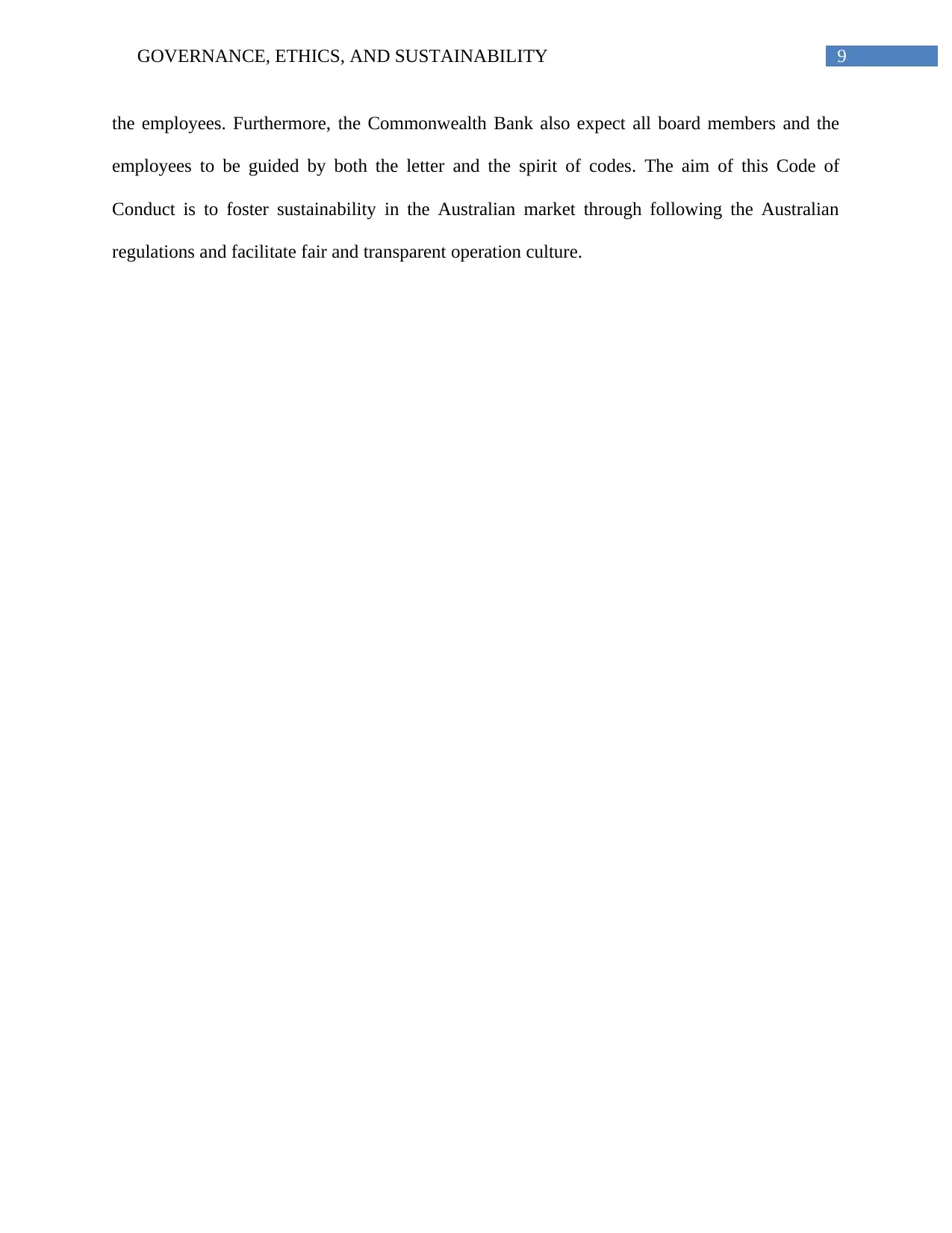
9GOVERNANCE, ETHICS, AND SUSTAINABILITY
the employees. Furthermore, the Commonwealth Bank also expect all board members and the
employees to be guided by both the letter and the spirit of codes. The aim of this Code of
Conduct is to foster sustainability in the Australian market through following the Australian
regulations and facilitate fair and transparent operation culture.
the employees. Furthermore, the Commonwealth Bank also expect all board members and the
employees to be guided by both the letter and the spirit of codes. The aim of this Code of
Conduct is to foster sustainability in the Australian market through following the Australian
regulations and facilitate fair and transparent operation culture.
Paraphrase This Document
Need a fresh take? Get an instant paraphrase of this document with our AI Paraphraser
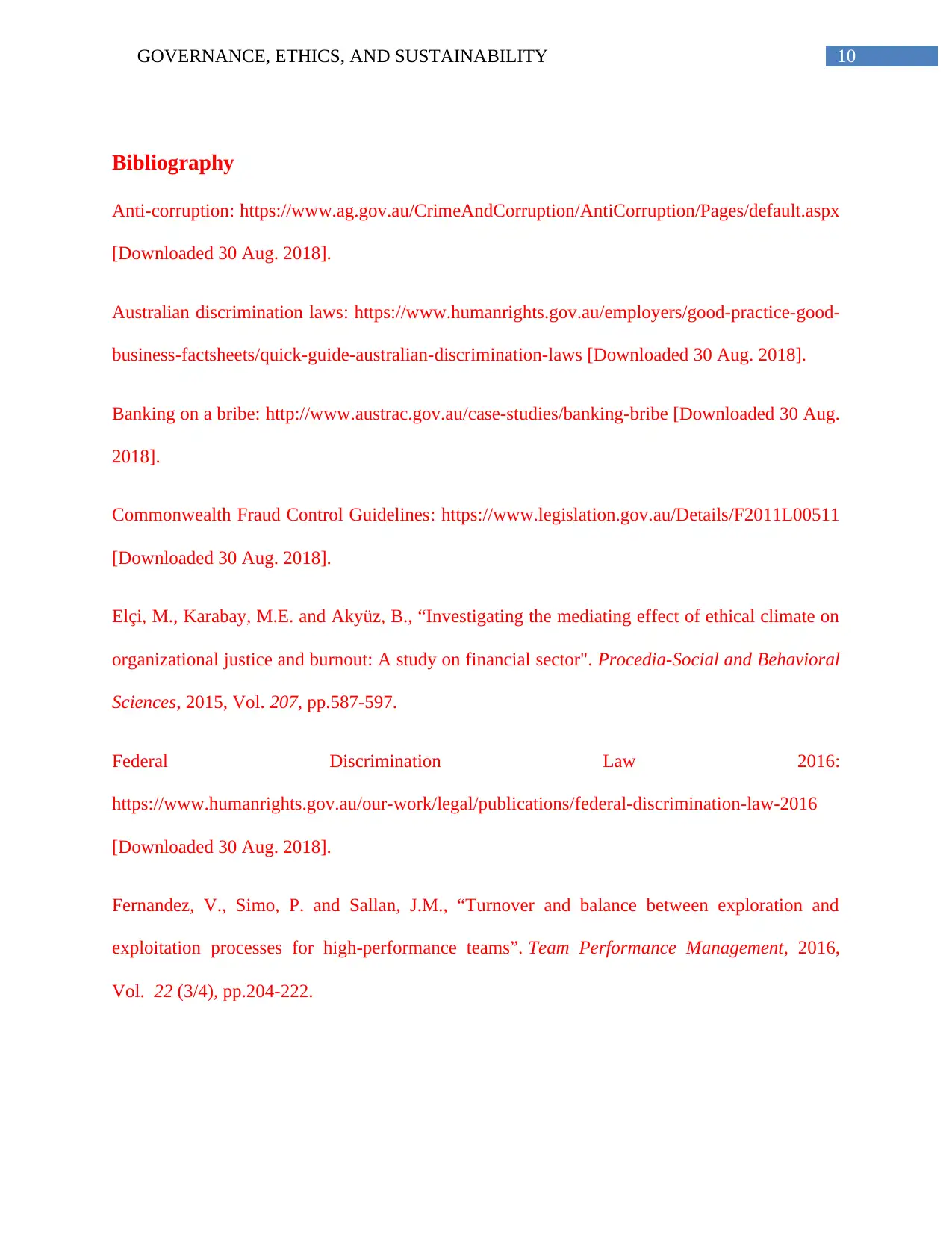
10GOVERNANCE, ETHICS, AND SUSTAINABILITY
Bibliography
Anti-corruption: https://www.ag.gov.au/CrimeAndCorruption/AntiCorruption/Pages/default.aspx
[Downloaded 30 Aug. 2018].
Australian discrimination laws: https://www.humanrights.gov.au/employers/good-practice-good-
business-factsheets/quick-guide-australian-discrimination-laws [Downloaded 30 Aug. 2018].
Banking on a bribe: http://www.austrac.gov.au/case-studies/banking-bribe [Downloaded 30 Aug.
2018].
Commonwealth Fraud Control Guidelines: https://www.legislation.gov.au/Details/F2011L00511
[Downloaded 30 Aug. 2018].
Elçi, M., Karabay, M.E. and Akyüz, B., “Investigating the mediating effect of ethical climate on
organizational justice and burnout: A study on financial sector". Procedia-Social and Behavioral
Sciences, 2015, Vol. 207, pp.587-597.
Federal Discrimination Law 2016:
https://www.humanrights.gov.au/our-work/legal/publications/federal-discrimination-law-2016
[Downloaded 30 Aug. 2018].
Fernandez, V., Simo, P. and Sallan, J.M., “Turnover and balance between exploration and
exploitation processes for high-performance teams”. Team Performance Management, 2016,
Vol. 22 (3/4), pp.204-222.
Bibliography
Anti-corruption: https://www.ag.gov.au/CrimeAndCorruption/AntiCorruption/Pages/default.aspx
[Downloaded 30 Aug. 2018].
Australian discrimination laws: https://www.humanrights.gov.au/employers/good-practice-good-
business-factsheets/quick-guide-australian-discrimination-laws [Downloaded 30 Aug. 2018].
Banking on a bribe: http://www.austrac.gov.au/case-studies/banking-bribe [Downloaded 30 Aug.
2018].
Commonwealth Fraud Control Guidelines: https://www.legislation.gov.au/Details/F2011L00511
[Downloaded 30 Aug. 2018].
Elçi, M., Karabay, M.E. and Akyüz, B., “Investigating the mediating effect of ethical climate on
organizational justice and burnout: A study on financial sector". Procedia-Social and Behavioral
Sciences, 2015, Vol. 207, pp.587-597.
Federal Discrimination Law 2016:
https://www.humanrights.gov.au/our-work/legal/publications/federal-discrimination-law-2016
[Downloaded 30 Aug. 2018].
Fernandez, V., Simo, P. and Sallan, J.M., “Turnover and balance between exploration and
exploitation processes for high-performance teams”. Team Performance Management, 2016,
Vol. 22 (3/4), pp.204-222.
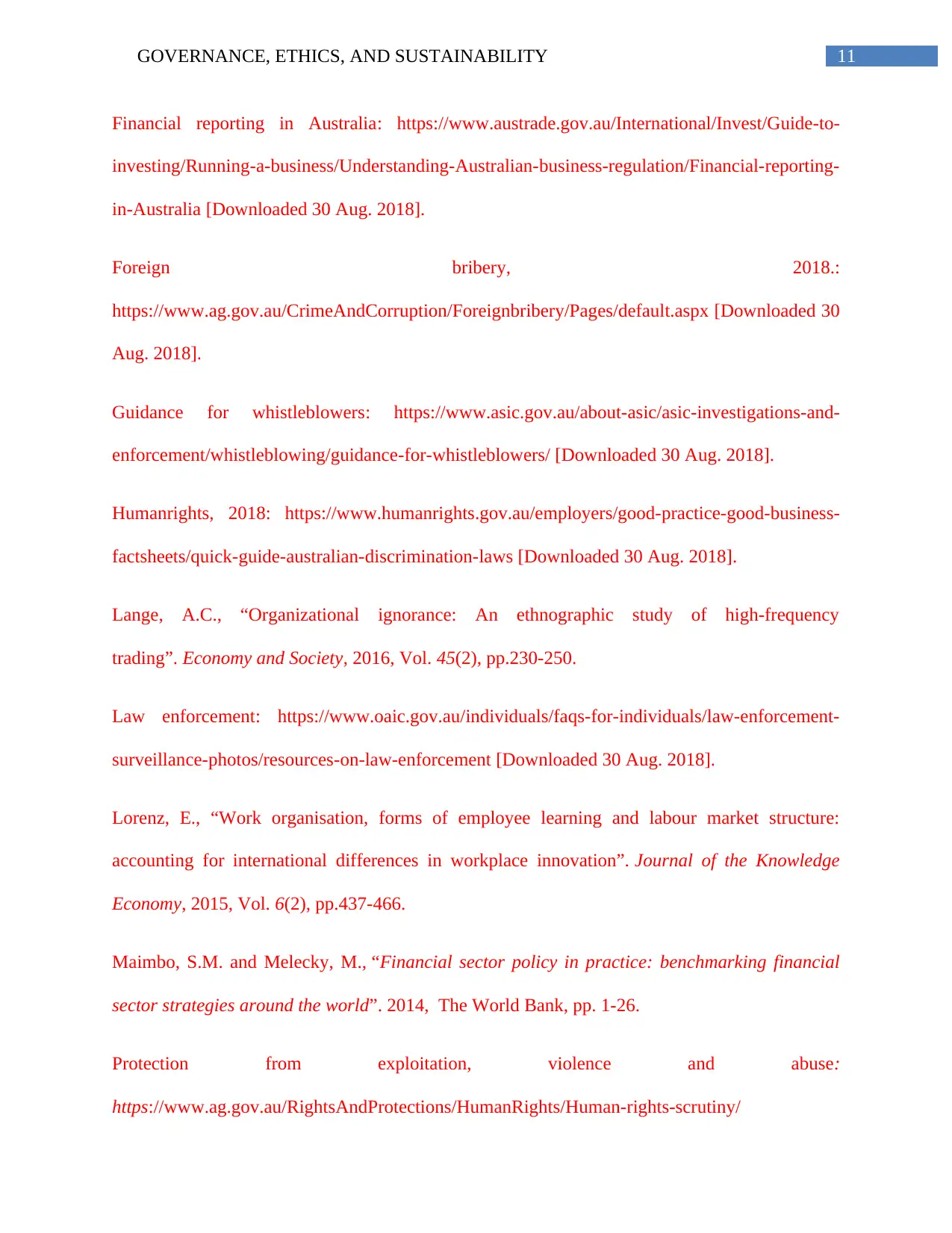
11GOVERNANCE, ETHICS, AND SUSTAINABILITY
Financial reporting in Australia: https://www.austrade.gov.au/International/Invest/Guide-to-
investing/Running-a-business/Understanding-Australian-business-regulation/Financial-reporting-
in-Australia [Downloaded 30 Aug. 2018].
Foreign bribery, 2018.:
https://www.ag.gov.au/CrimeAndCorruption/Foreignbribery/Pages/default.aspx [Downloaded 30
Aug. 2018].
Guidance for whistleblowers: https://www.asic.gov.au/about-asic/asic-investigations-and-
enforcement/whistleblowing/guidance-for-whistleblowers/ [Downloaded 30 Aug. 2018].
Humanrights, 2018: https://www.humanrights.gov.au/employers/good-practice-good-business-
factsheets/quick-guide-australian-discrimination-laws [Downloaded 30 Aug. 2018].
Lange, A.C., “Organizational ignorance: An ethnographic study of high-frequency
trading”. Economy and Society, 2016, Vol. 45(2), pp.230-250.
Law enforcement: https://www.oaic.gov.au/individuals/faqs-for-individuals/law-enforcement-
surveillance-photos/resources-on-law-enforcement [Downloaded 30 Aug. 2018].
Lorenz, E., “Work organisation, forms of employee learning and labour market structure:
accounting for international differences in workplace innovation”. Journal of the Knowledge
Economy, 2015, Vol. 6(2), pp.437-466.
Maimbo, S.M. and Melecky, M., “Financial sector policy in practice: benchmarking financial
sector strategies around the world”. 2014, The World Bank, pp. 1-26.
Protection from exploitation, violence and abuse:
https://www.ag.gov.au/RightsAndProtections/HumanRights/Human-rights-scrutiny/
Financial reporting in Australia: https://www.austrade.gov.au/International/Invest/Guide-to-
investing/Running-a-business/Understanding-Australian-business-regulation/Financial-reporting-
in-Australia [Downloaded 30 Aug. 2018].
Foreign bribery, 2018.:
https://www.ag.gov.au/CrimeAndCorruption/Foreignbribery/Pages/default.aspx [Downloaded 30
Aug. 2018].
Guidance for whistleblowers: https://www.asic.gov.au/about-asic/asic-investigations-and-
enforcement/whistleblowing/guidance-for-whistleblowers/ [Downloaded 30 Aug. 2018].
Humanrights, 2018: https://www.humanrights.gov.au/employers/good-practice-good-business-
factsheets/quick-guide-australian-discrimination-laws [Downloaded 30 Aug. 2018].
Lange, A.C., “Organizational ignorance: An ethnographic study of high-frequency
trading”. Economy and Society, 2016, Vol. 45(2), pp.230-250.
Law enforcement: https://www.oaic.gov.au/individuals/faqs-for-individuals/law-enforcement-
surveillance-photos/resources-on-law-enforcement [Downloaded 30 Aug. 2018].
Lorenz, E., “Work organisation, forms of employee learning and labour market structure:
accounting for international differences in workplace innovation”. Journal of the Knowledge
Economy, 2015, Vol. 6(2), pp.437-466.
Maimbo, S.M. and Melecky, M., “Financial sector policy in practice: benchmarking financial
sector strategies around the world”. 2014, The World Bank, pp. 1-26.
Protection from exploitation, violence and abuse:
https://www.ag.gov.au/RightsAndProtections/HumanRights/Human-rights-scrutiny/
⊘ This is a preview!⊘
Do you want full access?
Subscribe today to unlock all pages.

Trusted by 1+ million students worldwide
1 out of 13
Related Documents
Your All-in-One AI-Powered Toolkit for Academic Success.
+13062052269
info@desklib.com
Available 24*7 on WhatsApp / Email
![[object Object]](/_next/static/media/star-bottom.7253800d.svg)
Unlock your academic potential
Copyright © 2020–2026 A2Z Services. All Rights Reserved. Developed and managed by ZUCOL.




